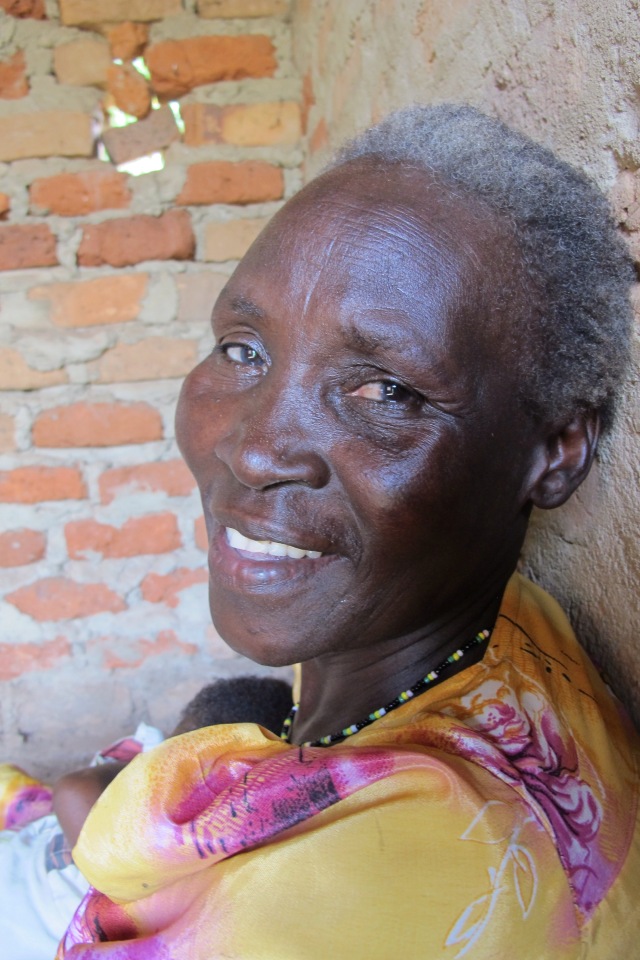The road to the chicken farm twists and turns and the wind whips up red dirt clouds under my billowing skirt. This is the red dirt I love under the tires of bodas, the red dirt that paints striking pictures from behind the lens of my camera. On the back of a boda, driving out to the site of chicken farm on a winding red, dirt road, I already feel at home. 
Gulu is growing up, roads are being paved, electricity is more regular, and it’s good, but the more the city grows up, the more I crave time in the villages.
Lamuno Alice is waiting for us outside of her home. She’s dressed in her best gomesi, a beautiful gold one, and baby Patience balances on her hip. Lamuno Alice, an expert chicken farmer, is to be the caretaker of the chicken farm, ensuring everything runs smoothly when my boys are at school. In exchange, she’ll receive chickens and a small part of the profits from the chicken farm will make sure her basic needs, like food and medicine, are met.
My boys committed to using the chicken farm to help care for widows and orphans and that starts with strong Lamuno Alice and sweet baby Patience. You have to be strong to live here, especially when you have loved and buried three husbands and then continued on your own. Lamuno Alice has made 63 years and at the young age of 62, she adopted Patience.
Lamuno has strength in depths I’ll never know.

I’m nervous to meet her because she’ll be an integral part of the success of the chicken farm, but what has me really nervous is that she’s also Opiyo Martin’s grandmother. She’s another piece in the puzzle of my Ugandan family and my nerves bounce in my stomach wondering how we will all fit together. I take a deep breath and try without success to pat down the wild springs that are my hair.
Lamuno is gracious and kind and welcoming. She hugs me tight and I feel steadied. Her brown eyes have blue rings around them, a captivating color I’ve never seen before. Unlike me, Baby Patience, Pash for short, does not calm down. She cries at the sight of my skin and would continue to cry each time she saw me.

Lamuno and the boys show me the property, outlining exactly where the chicken farm will be. We move into Lamuno’s home, where she offers me one of her three chairs. I decline and sit on the papyrus mat next to her. The boys take the chairs and serious budget talks begin.
The boys have almost doubled their start up expenses and they’re learning Hard Business Lesson #1: Stick to your budget. This is quickly followed by Hard Business Lesson #2: When you provide a proposed budget and then double it, don’t expect your mom to bail you out.
They slash their budget and I listen proudly as they carefully pick through their budget line by line, making adjustments until it fits within our agreement. They bounce back and forth fluidly between English and Luo. Lamuno Alice chimes in freely with her opinions about materials and the boys often stop to ask for her expertise.

I watch my three boys come together to double check everything, then assign roles and jobs. William, the oldest, has done most of the leg work, hustling in town to get prices and arrange for the help they need to begin construction. He’s appointed to purchase the materials, supervise the work and maintain the records. Martin, the people person of the three, will find people and places wanting to buy their chickens and soon will head up the charitable arm of the farm, too. As for Geoffrey, the youngest, his job is to graduate high school in November. It’s a miracle he’s made it this far and our little family has a singular wish for him to see that to completion.
Lamuno Alice will oversee the daily operations of the chicken farm and as I listen to her speak and plan with the boys, I sit back on the mat and breathe a sigh of relief.
This is going to work.
As the boys and Alice talk, I mostly keep quiet from behind my camera because I know nothing about raising chickens. What I do know is a good story when I see one and I take joy in documenting the one unfolding before me.
After three hours, we stand to leave and Lamuno Alice asks me when I’ll return. I assure her I’ll come back soon and she tells me she’s glad because she hasn’t cooked for me yet. I accept her offer and promise to return and eat bo’o with her. It’s one of my favorite Ugandan dishes and my stomach rumbles at the thought.
Lamuno Alice, with baby Pash still crying on her hip, walk us to the road. As we part ways, Alice calls out, “Bye, Lanyero!” I smile at my Acholi name and call out, “Apwoyo, Lamuno. Wa nen.” Thank you, Lamuno. See you soon. She smiles at my Luo and as I walk to catch a boda, flanked by my boys, I know the next time I visit, I’ll be completely at ease.
Maybe, just maybe, baby Pash will be, too.


This is beautifully written, Alicia. You make us feel as if we are there with you.
LikeLike
Thanks, Steve, I wish all of you were here with me.
LikeLike